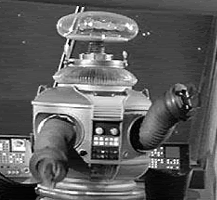Six o’clock this morning, my husband dropped me off at the Marin Airporter so I could go catch my plane. He hugged me long and hard and told me he was proud of me and that I was being very brave. He gave my forehead a protective kiss. I breathed deeply and tried to relax and gave him a half-hearted smile.
What terrible, challenging ordeal was I heading to? To see a sick or dying relative? To present in front of a huge, hostile crowd? To fight some medical or legal battle far away?
Nope. I was going on vacation, to Cabo San Lucas of all places.
But I was going alone. Without my husband. Not for work, but just because most of my students were headed out of town I wanted to, you know, enjoy myself.

Danger, Will Robinson!
One of the facets of the legacy of being raised by a mom with Narcissistic Personality Disorder is this deeply felt “rule” that I not abandon her. Read: do anything independently. Unless of course it a) reflects well on her (the conference for work loophole) or b) fulfills her needs. But to forsake her, for no good reason, based solely on my needs? Warning! Warning! Taboo being broken! All systems on high alert!
Never mind that my mom passed away four and a half years ago. Never mind that my husband and I were originally planning to go together, but that he decided he had too much to do at work so he couldn’t go. Never mind that he has never expressed fear of abandonment, or a reluctance to have me do things independently, but has always encouraged it and has been 100% supportive of this trip since I sheepishly, tentatively asked him if he wouldn’t mind if maybe I went somewhere without him. Never mind that I have learned over and over again in the fourteen years I have known him that he really, truly, for sure isn’t like my mother.
As any adult child of a difficult parent knows, it is the inner mom or dad (the introject, if you wanna get all psychoanalytical about it) who really knows how to patrol those taboos and tighten those thumbscrews.
introjection [in″tro-jek´shun]: an unconscious defense mechanism considered immature, in which loved or hated external objects are absorbed into the self as a means of diminishing anxiety by reducing the fear of loss (in the case of a loved object) or by internalizing the aggressive characteristic and putting it under control (in the case of a hated object).
So, as the date of my departure got closer and closer, the inner storm started raging stronger and stronger. The last two weeks have felt like those pictures of people walking against a winter blizzard, leaning into the wind, pushing forward with heroic energy and a tiny, battered umbrella, just to get to the car. Everyday tasks–answering email, doing the dishes–have felt insurmountable. Healthy habits like working out in the morning have been waylaid by nightly 1:00 to 3:00am insomnia. My never robust immune system has pretty much lay down and cried mercy. And always, for no apparent reason, the floating anxiety and the constant stream of questions to my husband–Are you mad at me? Do you really love me? Are you sure?
Readers of this blog may be wondering why the sudden autobiographical turn? What does this all have to do with teaching or parenting or children? Well, consider this a plea from my wounded inner-child on behalf of your actual, physical child or student: please remember how important it is to support, really, truly and preferably with enthusiasm and encouragement, the independence of your growing kids.
Not that any parent or teacher, even my mom, purposely sets about to fetter a child’s independence. At the same time, I can’t even count the number of times a parent has told me something like, “Ugh! My child is almost a teenager. I’m so in trouble.” And facebook posts are replete of horror stories about the growing, chaotic defiance of two year olds, which are inevitably met with a flurry of sympathy and similar war stories. It is a cultural truism that kids in the midst of he Terrible Twos and Adolescence are the worst to parent. To paraphrase Tom Paine, These are the times that try moms’ souls. But what is really going on during these tumultuous times? Kids are discovering and proving their independence; technically, they are individuating.
Individuation: the process by which an individual becomes distinct, how a being becomes an independent, separate entity. A psychological process described by Carl Jung–becoming your own person, with your own beliefs and ideals that might be separate from those of your parents and society.
When I was seventeen and working at a pretty awful day care center, the pretty awful owner shook her head disapprovingly at one of the two-year-olds. “I don’t know what happened to Sebastian. He used to be such a good child!”

Striking out on your own
Even at seventeen with my rudimentary knowledge of psychology and child development, I thought to myself, “He turned two. That’s what happened. That’s what is supposed to happen.” Even then I knew something was unhealthy about framing this developmental milestone as the transition from Good Child (obedient and compliant) to Bad Child (saying no! doing things his way!). Long talks with my psychologist mother confirmed my suspicions (ironic, right? Physician, heal thyself! My mom knew how important supporting a child’s independence was, and could help her clients and her trainees do it, but her own narcissistic wounding made it way too threatening when it came to her children striking out on their own).
Even though all parents consciously want to support their children’s independence, they still often express frustration and even pain during the Twos. I totally understand that this phase of development is challenging–especially compared to the easier times immediately before. But, if I could wave my magic wand in the very midst of every parent’s most frustrating moment with their toddler, I would wish them to fully feel–not just understand intellectually, but on a gut level–a handful of things.

Failure to Launch: the real alternative to individuation
1) Individuation is a good thing. A really good thing. Do you really want your child to be living in your basement at 35? (Or struggling to go on vacation by themselves at 45?) Well, this is where that independence begins.
2) Saying no is the best, most efficient, clearest way to proclaim, “I am not you. I am me!”
I remember babysitting a two and a half year old, when “yes” seemed to have been sucked from her vocabulary, replaced by the ubiquitous “No!” I quickly learned that I had to ask every question two ways, because she simply wasn’t going to say yes, come hell or high water. “Do you want to keep swinging?” Silence. “Do you want to get down now?” “No!!!”
3) These declarations of independent selfhood has nothing to do with you, with how nice you are, how good a parent you are, or how much you love your child or your child loves you. It may feel like a rejection, but really it is just the first time your child has fully realized they are a separate person from you. Before that, they are not completely clear emotionally or even physically where exactly they end and you begin.
4) These declarations of independence have nothing to do with your child “being bad” or disobedient or acting out. As exasperating as they can be, they are not negative at all. In fact, if your child weren’t saying no and insisting on their right to do things their way, then you’d have reason to worry. Just keep that image of the 35-year-old child living in your basement as the true alternative to this current behavior.
5) Accepting, honoring and even encouraging these declarations of independence is one of the greatest gifts you can give your child. And frankly, so what if they don’t want to wear the socks you picked out simply because you picked them? So what if they want peas when you suggest carrots and carrots when you suggest peas? So what if they say no a hundred gazillion times a day? Is it really so bad? Do these little pushbacks really matter? I am not saying your child should have no boundaries and should be allowed to step out in front of a moving bus or eat only marshmallows for a year, but how many of the issues actually matter for safety and security, and how many can be let go?
The other period of individuation that is important for adults to understand and support is what some people call the Second Terrible Twos–adolescence. Kids once again struggle with identity–this time, what kind of an adult will I be? Will I be like Mom, or Dad, or something all my own? Which group do I fit in with at school, or am I an outsider, and if so, which kind? Peers become more important than adults. The signs and symbols created to distinguish the new generation from those that came before become paramount. Even though this dance of individuation is universal historically, generationally and geographically, it still challenges many adults.
I remember teaching an eighth grade boy who had curly shoulder-length hair. He came in one day with it cut short, and I expressed sadness. He said, “Yeah, my mom was sad too. She liked it long because she grew up in the sixties and stuff. But I got sick of it.” What Mom had been encouraging because it reminded her of her generation’s rebellious music, hair, clothing and language, my eighth grader rebelled against in order to join with his own generation’s culture of music, hair, clothing, language, inevitably defined against the previous generation’s. Likewise, I had a mother of a teenage boy tell me that Catcher in the Rye simply was better written with more substance and depth than the stuff that passed for rebellious teen fiction these days.
In the school setting, I talked to a teacher once who taught third, fourth and seventh grade. She was so disappointed that her wonderful group of fourth graders who had loved her had turned into a rambunctious group of seventh graders who questioned everything she said and cared more about making each other laugh than about making her happy. She took their natural, healthy turn towards individuation as personally and as negatively as the daycare center owner had taken little Sebastian’s turn into a toddler.

Individuation can be challenging
In case you are in the middle of asking yourself, “What ever happened to my sweet little child who used to like me and listen to me,” remember that during adolescence, it again becomes important to support, understand and encourage these stormy throws towards independence. To not take them personally. To not punish them. To accept that a teen will say, “I hate you, you don’t understand me,” one minute and then to accept that s/he may need to come to you for safety and reassurance the next simply because s/he needs to individuate in a supportive environment. Again, what may feel like rejection is not about you or how good a parent or teacher you are; it’s just the natural, developmentally appropriate phase they have to go through on the way to become their true, authentic self. And to avoid living on that couch in your basement.
Although children’s adolescence is difficult for all adults, it is especially challenging for parents with Narcissistic Personality Disorder. For them, everything is personal. That is to say, they have incredible trouble with boundaries and the behavior of those around them is always interpreted as being a reaction to themselves. Relatedly, they also feel most comfortable merged with others. Difference seems dangerous–they take it as a criticism of themselves. Oftentimes, narcissistic parents do great with babies–a baby merges with her primary caregiver, loves her unconditionally, and has no threatening boundaries. When that baby starts to define her own boundaries, the narcissist feels it as a personal, often unbearable, rejection. Betrayal of the highest order. An unbearable betrayal that they face again as their child hits adolescence. A betrayal that my mother communicated to me as ubiquitously as water to a fish, until I simply stopped.
Now skip ahead 22 years, almost every one filled with therapy, and I am taking my first solo vacation for fun, for no reason except I want to, and I’m doing it even though my husband decided he couldn’t take the time off. I consider myself blessed (and thank the first 15 years of therapy) to have married a man who says unconditionally, over and over, “No, I’m not mad at you. Yes I love you. Yes this is really ok.” As Lori, a couples’ counselor we saw before we got married, once told me, “Your nervous system is going to be so relieved when you realize your husband is not your mother.” No doubt. My husband is finally making it safe for me to individuate.



I laughed when reading about how you had to ask twice while baby sitting (keep swining? silence. get off? no!).
Wise words.
I’ve grown up to be an individual. That’s how my parents raised me, so that I would be able to take care of myself. However, once they realized that I could and did… they started complaining and suddenly wanted me back home, living with them until I die.
Oy! Go figure. Hope you have figured out a way to manage their kind of mixed messages!
Every time I do/ did, I am/ was proven wrong. Some people you just can’t please.
I am the daughter of a stepmother with NPD AND a mother who had NPD, schizoaffective disorder, borderline personality disorder, and OCD. (Apparently my dad can pick em). I LOVED your post and related so much. I have an almost 9 year old son and I always joke to my husband that we know we have done a good job when he’s not living in our basement someday. I look forward to reading more of your posts. We need to sit down and have coffee one day!!! LOL
No doubt. It is hard to break the cycle–I wonder how your father was raised, picking those women. Good for you and your husband!
Ironically – my dad’s mom – my grandmother – was one of the most wonderful people in my life and was the only positive adult figure I had in my life growing up!
Interesting. Hmm…Dad’s Dad?
He was very closed off and grumpy. My dad grew up an identical twin, but my grandma had a baby when they were 5 who was stillborn and it was never ever spoken about. I wonder if there was something that affected the dynamics of e home after that happened.
It certainly could have. One could imagine your grandmother having a serious bout of depression, which may create a narcissistic wounding, especially if her husband was not the most emotionally supportive. And back then, the idea of getting professional help, or even just talking about trauma, was kind of discouraged. Of course, this is just speculation.
Diana, I love your story of raw self-reflection and discovery. It takes a lot of courage to be vulnerable in your writing, and I love how that vulnerability is a portal to being a more empathetic educational therapist.
thanks. Not coincidentally, I just recently read Brene Brown’s Daring Greatly.
Diane, Had a similar experience growing up. So suppressed. Thank you for reminding parents to be mindful and try, (before giving a knee-jerk reaction), just try to put ourselves in our children’s shoes, and/or recall what it was like to be young and impressionable.
Sorry you did as well. I feel you, as the kids say. I think your use of the word Mindful is really important–that’s how we can overcome our own childhoods and parent differently than we were parented.
Too much individualism for me. It gets lonely.
What does individualism mean to you in this instance?
Are you not comfortable with yourself? Do you have issues entertaining yourself? Are you not enough for yourself?
I’m working on it!
Excellent post. I gained so much understanding from it.
Thanks!